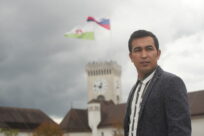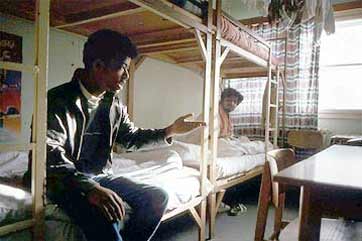Hungary sees need for better integration as more refugees stay
Thursday 28, July 2005
BUDAPEST, July 28 (UNHCR) – “I know that I came by my own decision. Hungary did not invite me to come. So I cannot ask for too much, but a little kick would help our integration a lot,” says Arkan Al-Hassani*, an Iraqi refugee in the reception centre in Bicske, 30 km west of the Hungarian capital, Budapest.
Al-Hassani has a point. Asylum seekers in Hungary are well taken care of. Asylum laws, reception facilities and asylum procedures are of a high standard. But once they are recognised as refugees, they struggle to get their feet on the ground.
Al-Hassani’s wife Armine* comes from Armenia. They met in Budapest in 2001, when they were both newly-arrived asylum seekers. Today they are a young family with two little boys. With UNHCR’s assistance, they even managed to bring Armine’s 12-year-old daughter from a previous marriage to Hungary a month ago. The family is still occupying a single room in the Bicske reception centre. They know they have to leave by the end of the year.
“This centre serves primarily for asylum seekers and for persons with a temporary humanitarian status,” explains Sandor Hoes, who manages the centre-cum-camp. “The Al-Hassanis have already been recognised as refugees. That means that they have permanent legal status and permission to work. But they have to leave this centre. The Hungarian government expects them to become independent and integrate in Hungarian society.”
Al-Hassani understands this concept. He did what he could to prepare for self-reliance. He found a steady job and learned Hungarian together with his wife. But the finances do not work out. The young man is planning and calculating – if he buys a house, he can have an interest-free loan of 1.5 million forint (US$7,500). If he rents property, the government will pay them subsidies of up to 40 percent of rental fees for a maximum of two years. With his current salary, neither option will allow him to cover all family expenses.
So he keeps looking for accommodation and searching for solutions, while Armine is trying to master medical terminology in Hungarian. “I am a qualified senior nurse for dermatology,” she says. “If I manage to do the necessary exams, I should be able to have my qualifications recognised and get a well-paid job. Then our situation will improve.”
“In the beginning it was very difficult for us too,” says Lucy Bajrami, a recognised refugee from Kosovo. She works as a cleaner in a social institution in Biscke. Coming from a Roma ethnic background, Bajrami had to flee Kosovo on foot in 1999 together with her husband and her five children. In Hungary, they finally reached safety.
When they were recognised as refugees a year ago, they also had to leave Bicske centre and rent a house. “We were lucky that we both already had jobs. We live and work in Bicske and we are very happy here.”
The children speak Hungarian to each other, and Bajrami sometimes has to remind them to practise their Albanian language. “They are good pupils and they will have good lives here in Hungary. It was the right decision to stay here.”
Other asylum seekers would very much like to stay and integrate, but they are still struggling for official status. The Turkovic* family is one such example. Zoran Turkovic, a well-known public figure in the northern Yugoslav region of Vojvodina, was a vocal critic of Slobodan Milosevic’s regime. He fled his homeland for Budapest in 1999 with his wife and teenage daughter.
A renowned expert in antiques and a trained tourism manager, Turkovic hoped to find work immediately in Budapest. But he was never granted asylum. “No papers, no legal employment. I did the odd job here and there, but I could never have a real job.”
When the Turkovics’ application for asylum or at least a humanitarian status was rejected a few months ago, they decided to give up and return home. “We thought that things back home might have improved after all,” says Turkovic.
But the situation soon spiralled out of control. The family received death threats, their old house was vandalised and even their relatives got anonymous calls. When Turkovic was physically assaulted in town in broad daylight, they packed their things in panic and left for Hungary once again.
“Now we have re-applied [for asylum] in the light of these new developments. We hope so much that we will be allowed to stay. Many other asylum seekers here move on to Western Europe, but for us Hungary is a good country,” says Turkovic.
Not all refugees would agree with the Al-Hassanis, the Bajramis or the Turkovics. Many asylum seekers see Hungary merely as a point of entry into the European Union and move on soon.
“It depends very much on their nationality,” says camp manager Hoes. African refugees usually stay. “They seek peace and quiet, a little business to make a living and contacts with the African community. They can have all of that in Budapest.”
The same is true for Ukrainian asylum seekers who prefer to settle in Hungary, close to their home country. Georgians tend to wait until they have refugee papers and then leave for Germany, where many of them have friends and relatives, says Hoes. “Iraqis in most cases also prefer moving on to staying in Hungary.”
Lloyd Dakin, UNHCR’s Regional Representative in Central Europe, notes that in the past, the countries in the region have been countries of transit rather than final destinations, in the mindset of both asylum seekers and governments. “But now since they are members of the EU, we expect that to change. Integration is after all a way of sharing responsibilities within Europe.”
In Hungary, positive developments are already underway. “Integration is a complex endeavour, touching upon education, employment, housing, health care and many other issues,” says Dakin. “We are happy to see that an inter-ministerial working group has been established to develop a comprehensive integration policy.”
To that end, Hungary is being assisted by Greece in the framework of an EU twinning project for new member states.
“Positive steps have been taken in Hungary and before long, it will have a direct positive impact on refugee lives,” says Dakin. “Other Central European countries will follow suit soon and then this region, which itself has produced hundreds of thousands of refugees, will be a home for those who need protecting now.”
* Not their real names
Melita Sunjic in Budapest, Hungary
Page 1 of 11
-

Afghan nurse gives heartfelt care to patients in Slovenia
4 Jan 2024Bashir Rezai came to Slovenia as an unaccompanied minor. Now a citizen of his adopted country, he has bright prospects in the nursing profession.
-

Mayor of small border town responds to a call of humanity
18 Aug 2022László Helmeczi was halfway through his second term as the mayor of a quiet town on the Hungarian – Ukrainian border, until one day he woke at the forefront of an international humanitarian crisis.
-

Ukrainian teenager touches Slovenians with sensitivity at the piano
17 May 2022Living in a world of sound, Vika, 13, is accompanied by an inner music that helps her find her way.
-

Cloud of uncertainty starts to lift for Ukrainian sisters fleeing war
20 Apr 2022Antonina and Natasha arrive in Slovakia without a plan. By evening, with help from UNHCR, they have beds and hope for the future…
-

Ukrainian-Syrian couple have their lives upended by outbreak of war
4 Apr 2022Katya is seeing war for the first time but her husband Youssef already has this bitter experience
-

UNHCR acknowledges refugee youth’s effort and diligence
25 Jun 2021This year the Office of the United Nations High Commissioner for Refugees in the Czech Republic recognized 16 refugees and asylum seekers who have achieved excellent academic performance in Czech schools. This traditional UNHCR event takes place every two years on World Refugee Day. The Ministry of Education, Youth and Sports began overseeing the ceremonies in 2004.
-

Posters Urge Passengers and Passersby to Remember Refugees
21 Jun 2021Marking World Refugee Day, UNHCR has launched a billboard campaign on the streets and metro stations of Budapest to raise awareness of refugees
-

Afghan teacher finds peace and opportunity in Hungary
19 Jun 2021Omar Sharifullah has carved out a livelihood that supports both his own family in Hungary and traditional artisans in Afghanistan
-

Europe felt like a “desert” to refugee arriving from Egypt
29 Jan 2021Kareem Tuha describes the social isolation he experienced in his first months in Prague
-

Refugees Express Their Hopes at Romanian Art Workshop
24 Nov 2020Waiting to be resettled, refugees in transit keep cheerful by painting on T-shirt

